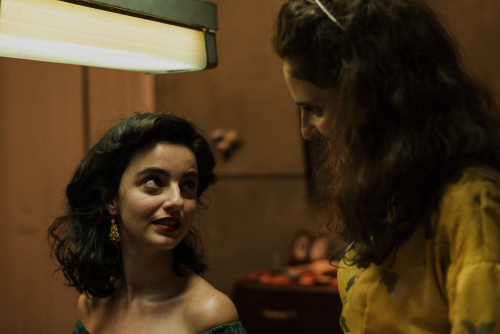
Bruno Machado/BFI London Film Festival 2019
MOVIE REVIEW
Invisible Life (2019)
Teenage Eurídice (Carol Duarte) has a slightly older sister called Guida (Julia Stockler). They live a precarious middle-class existence in 1950s Rio de Janeiro, under the thumb of their unkind father Manuel (António Fonseca). Guida plans to escape via her Greek sailor boyfriend. Eurídice escapes via her world-class piano playing. Life being what it is, things don’t work out the way the sisters planned. Manuel being who he is, things are much, much worse than they need to be. The title implies something hidden would be made visible, but the movie delivers a very different story.
The major mistake Eurídice makes is marriage to Antenor (Gregorio Duvivier), the son of her father’s boss. It’s a decision that goes so against of what we know of Eurídice’s character that the movie’s complete failure to explain it in any way undermines everything. Director Karim Aïnouz, who adapted the screenplay of Martha Batalha’s novel with Murilo Hauser and Inés Bortagaray, made a serious mistake there. The movie’s unusual sexual explicitness – which includes a close-up of an erect penis and profoundly intimate shots of Ms. Duarte – implies a reason for this choice that nothing we see of their marriage supports. Whether or not Manuel forced her into it isn’t even hinted at. It’s an astounding omission, one that needlessly damages our sympathy for Eurídice.
Guida’s struggles – which include a childbirth scene of shocking brutality – make much more sense. She is a much more sympathetic character, especially once she finds Filomena (Bárbara Santos), a retired sex worker who runs an illegal daycare that is the saving grace of their rundown neighborhood. After a very bad start, Guida becomes a wonderful mother to her little son, but endless poverty and the grinding stigma as a result of her choices is relentless and humiliating. She finds work in Rio’s shipyards, thinking Eurídice is studying music in Vienna. Eurídice is a miserable housewife in the hills, thinking Guida is a happy homemaker in Greece. Their separation is a profound and scarring betrayal, on a par with that of the sisters in “The Color Purple.” But here redemption is too much to hope for.
It’s no wonder things work out for Eurídice the way they do, but Ms. Duarte deserved a better chance to show us how the little things slowly crushed the will out of her. The nuances of Brazilian society, including how race intersects with class and how overwhelming the patriarchy is, are shown, but Mr. Aïnouz is more interested in Ms. Duarte’s body than Eurídice’s mind. Guida has much more fire and Ms. Stockler does a wonderful job embodying how a hard life doesn’t have to break you. Cinematographer Hélène Louvart films Ms. Stockler noticeably more respectfully, too. The inconsistency rankles, especially in the scene in the restaurant, which deserved a little more slowness, and sharper turns of the knife, so its full horror could be absorbed in one knockout blow.
That said, the movie has a grotty beauty and an unblinking understanding of the realities of living in a body. It has a great feeling of physical reality, of the cramped and sweaty spaces of its dirty city, and of its heat and noise. Its music, and its understanding of what Eurídice needs so desperately from her piano playing, gives a veneer of tenderness to everything Eurídice touches. It’s a disappointment that the movie fails her story as much as her life failed her.
Comments